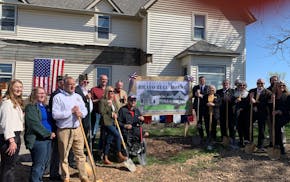Patty Boever was glad to have a sanctuary at the Dakota County Courthouse during the trial of a man accused in the hit-and-run death of her daughter.
Eric Hunter of Rosemount was tried last month for leaving Joannie LeVasseur dying on an Apple Valley street last year.
As she waited days for a verdict, Boever expressed gratitude that she and her family could wait in one of two special rooms in the County Attorney's Office -- and avoid Hunter in the hallways.
The waiting rooms are just one way the Dakota County Attorney's Office aids thousands of victims and witnesses every year in its victim-witness program, one of the state's first.
In a criminal justice system where much of the focus is on the accused, the victims of crime and their families might end up feeling overlooked. The job of Dakota County's five-person victim-witness unit is to make sure that doesn't happen. Advocates in the program help people affected by crime navigate a complicated court system, offer counseling during hard times and help them prepare to testify if needed, among other things.
"Our office's victim-witness unit plays a big role in the work we do, a very important role in what we do each and every day as we try to reach out to crime victims to offer them some assurance, some understanding, some help," County Attorney James Backstrom said.
In 1977, Dakota County began its program under County Attorney John Sonsteng. In 1992, his successor, Backstrom, had the first waiting room built, which is among protections for victims required by state law. A second room was added two years ago. They have televisions, toys and books.
The unit each year helps about 3,000 victims and thousands more witnesses. It's been especially busy recently, said supervisor Kelly Nicholson.
From July to September, for example, one advocate alone had roughly 1,500 contacts with adult victims.
"Families come in here with a whole range of emotions, and we have to work with them and be supportive, and also find out what the attorneys need," Nicholson said. "We have to figure out who needs to be here and where they need to be."
Showing that they care
Wednesday, Darrell Carlson of Wabasha and other grieving relatives were assisted by advocate Krista Kim-Munoz during a hearing for a woman charged with vehicular homicide in the 2008 deaths of his daughter, 2-year-old grandson and a 4-year-old friend.
Carlson said he's upset by delays in the case. And he lamented to the advocate that his daughter's surviving son, now 12, was taken away by Goodhue County social workers.
Victims can feel overwhelmed and frightened as they step into a daunting system, Backstrom said.
"It can be very frustrating, as there are many delays, so we try to help our victims through this difficult process in a very professional way that also shows that we care," he said.
In addition to Nicholson and Kim-Munoz, there's a third victim-witness specialist, Shelly Weber, and two assistants who make contact with victims and witnesses, issue subpoenas and help get restitution.
The program helps victims participate in proceedings and write impact statements. And each year, it uses a $5,000 state grant to provide emergency funds to victims for lost wages, child care, burials and more.
The advocates provide counseling and compassion, including in times of great disappointment.
They spent a lot of time with survivors of a woman, her daughter and granddaughter who were killed in a Lakeville crash nearly a year ago. The long, frustrating process led to a teen being charged with misdemeanor careless driving, a charge that wasn't as severe as what the family wanted.
While not completely satisfied, that family felt informed and included in the process, Nicholson said.
"Sometimes people can get upset because somebody is pled down to a lesser offense, and that can be really hard for victims," said Ann Sheridan, director of Violence Prevention for 360 Communities, which runs women's shelters in Eagan and Hastings.
Sheridan said the victim-witness program is great at informing victims, step-by-step, what will happen in court. It helps them understand plea deals and reduce stress.
"When they're in the courthouse, the victim advocates meet them downstairs or up in the office, so it's very secure," Sheridan said. "The victim advocate will be with them the whole time."
Helping many
The unit's heavy load lately included preparing for the trial of Peter Stibal, a former Burnsville Scout leader accused of molesting four boys. The advocates readied victims and dozens of witnesses, but the case was delayed.
There was the sentencing for a woman who broke a baby girl's bones, too. Her parents said they would have been "lost" without the advocates.
They aided the family of a young man fatally shot in a struggle with a friend, who was acquitted of manslaughter.
The advocates also helped five victims who testified against a man accused of molesting them during massage therapy in Apple Valley.
Despite advocates' care and attention, Patty Boever and family were disappointed after the jury deadlocked over the deadly hit-and-run.
In a retrial, advocates will again arrange to have an extra court reporter transcribe testimony so the victim's brother, who is deaf, can read along on a screen.
From a grieving mother to a young girl, the unit also recently helped those who wept as they testified about a toddler's slaying.
"Serving the victims of crime," Backstrom said, "is one of the most important things that we do in our work as prosecutors in this office and others across the state and nation."
Joy Powell • 952-882-9017

Hennepin County Attorney inks contract with D.C. law firm to prosecute trooper Londregan case

Defense attorneys in Feeding Our Future trial cast doubt on FBI's meal fraud investigation

Protesters hold dueling Gaza rallies at University of Minnesota

Overdose deaths spike after incarceration, but Minnesota jails lack treatment

